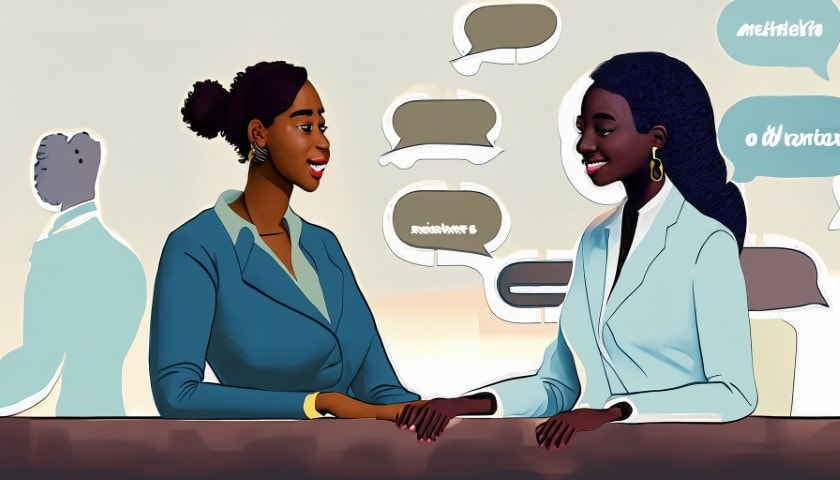


Listen with heart
by Mariusz | May 18, 2024 | Better communicator

Magic Words by Jonah Berger
by Mariusz | Oct 10, 2023 | Better communicator
Bardzo mi przykro, ale lekcje na platformie The Blue Tree działają jedynie na komputerze lub tablecie.
Do zobaczenia na większym ekranie 🙂
Zespół The Blue Tree
back to HOME > Personal Development > Better Communicator >
THE BLUE TREE
Better
Communicator

CEFR B2
Upper
Intermediate
warm up
In this lesson we will review the book “Magic Words” by Jonah Berger. Have a look at some discussion questions below. Answer them using your own experience. Listen to some model answers and relate back what you have heard.
| The Power of Words: Can you recall a time when someone’s words had a significant impact on your feelings or decisions, either positively or negatively? How did that make you feel, and why do you think those particular words had such an effect on you? | |
| Self-Persuasion: Have you ever used specific words or phrases to motivate or discourage yourself from doing something? For instance, telling yourself ‘I can’t’ versus ‘I don’t’ when faced with a temptation or challenge? | |
| Influence on Others: Have you noticed how different words or approaches can change people’s reactions or decisions? For example, how asking someone ‘Could you help me?’ might have a different response compared to ‘Would you mind helping me?’ Why do you think that is? |

part one
key language
Study the words below. Make sure you understand them well.
Listen to the recording to learn how to pronounce them.
| to double the chances | podwajać szanse | Winning the lottery would double the chances of him going on a world tour. | |
| enormous | ogromny | The elephant has an enormous size compared to the mouse. | |
| banish | wypędzanie, usuwanie | She is banishing the negative thoughts from her mind. | |
| nerves | nerwy | I always get nerves before speaking in public. | |
| performance | występ, wykonanie | Her performance in the play was outstanding. | |
| dramatically | dramatycznie | His health improved dramatically after changing his diet. |
watch the video
COMPREHENSION
- ⌚ 0:19 How powerful are words?
- ⌚ 0:21 What will the first word help you with?
- ⌚ 0:22 What will the second word help you with?
- ⌚ 0:23 What’s the power of this category of words we will learn later in this lesson?
part two
key language
Study the words below. Make sure you understand them well.
| enhanced | wzmocniony, podkreślony | The spices enhanced the flavor of the dish. | |
| tempted | kuszony | She was tempted to eat the last piece of cake. | |
| substitution | substytucja | Almond milk is a common substitution for dairy milk in vegan recipes. | |
| autonomy | autonomia | Achieving autonomy in decision-making is crucial for personal growth. | |
| locus of control | ośrodek kontroli | Believing in fate means having an external locus of control. | |
| heightens | podnosi, wzmacnia | The suspense heightens as the story progresses. | |
| extinguishes | gasi, tłumi | The rain extinguishes the campfire. | |
| non-negotiable | niepodlegający negocjacjom | The terms of the contract were non-negotiable. | |
| leverage | wykorzystać | She wants to leverage her skills in the new job. | |
| prioritize | priorytetyzować | It’s essential to prioritize your tasks to be productive. | |
| directive | dyrektywa, polecenie | The manager gave a clear directive to the team. | |
| persuasive | przekonywujący | His argument was so persuasive that everyone agreed. | |
| prone | podatny | Some plants are prone to certain pests. | |
| resistance | opór | There was a lot of resistance to the new policy. |
watch the video
COMPREHENSION
- ⌚ 0:45 What were the first group of participants told to do?
- ⌚ 0:50 What were the second group supposed to say to themselves?
- ⌚ 1:07 What effect did this have in the end?
- ⌚ 1:27 How does saying “I can’t” make us feel?
- ⌚ 1:34 What happens when we say “I don’t”?
- ⌚ 1:51 What are other benefits of using “I don’t”?
- ⌚ 2:05 How can we leverage the power of “I don’t”?
- ⌚ 2:25 Which of the three examples resonates with you the most?
- ⌚ 2:38 Why is it important to use “because” and “choose to”?
part three
key language
Study the words below. Make sure you understand them well.
| nerve-wracking | denerwujący | Preparing for the exam was a nerve-wracking experience. | |
| self-talk | rozmowa z sobą | Self-talk can be a useful tool for motivation and reflection. | |
| intensifies | wzmacnia, potęguje | The music intensifies as the movie reaches its climax. | |
| qualifications | kwalifikacje | His qualifications make him suitable for the job. | |
| cortisol | kortyzol | Stress can increase the levels of cortisol in the body. | |
| prompts | pobudza, skłania | The bright colors prompted her to buy the dress. | |
| supportive | wspierający | He has always been a supportive friend. | |
| declarations | deklaracje | She made several bold declarations during the meeting. | |
| procrastinating | zwlekanie | Stop procrastinating and start working on your project. | |
| dissatisfying | niesatysfakcjonujący | The food at that restaurant was quite dissatisfying. |
watch the video
COMPREHENSION
- ⌚ 3:09 How do many people self-talk? Which pronouns do they use?
- ⌚ 3:32 What should we replace the “I” pronoun with?
- ⌚ 3:49 How did the presenters who used the second person self-talk perform on a presentation?
- ⌚ 4:02 What is the benefit of seeing the situation from a supportive coach perspective?
- ⌚ 4:13 What words can boost your confidence even further?
part four
key language
Study the words below. Make sure you understand them well.
| striving | dążenie | She is striving to achieve excellence in her studies. | |
| boost | zwiększyć, podnieść | The advert gave a significant boost to sales. | |
| lecturing | wykładanie, pouczanie | He’s been lecturing at the university for years. | |
| elite | elita | She belongs to the elite group of athletes in the country. | |
| uphold | podtrzymywać, przestrzegać | It’s important to uphold the traditions of our ancestors. | |
| turnout | frekwencja | The turnout for the event was much higher than expected. | |
| cheater | oszust | Nobody likes a cheater in a game. | |
| concise | zwięzły | Her writing style is clear and concise. |
watch the video
COMPREHENSION
- ⌚ 4:39 How can you help a person who got stuck?
- ⌚ 5:07 What do “could” questions help people to focus on?
- ⌚ 5:23 What do good coaches know and what do they say to their clients as a result?
- ⌚ 5:42 When people don’t do what we expect them to do, what shouldn’t we do?
- ⌚ 5:42 What should we do instead?
- ⌚ 6:06 What examples illustrate the power of building identity?
- ⌚ 6:20 Why is turning actions into identities effective?
POLL
Cast your vote in the poll below.

PRACTICE
Let’s revise the vocabulary from this lesson.
Play this Multidecker flashcard game.

Leave a lasting memory using as few words as possible
by Mariusz | Jan 21, 2023 | Better communicator

English for business meetings
by Mariusz | Dec 24, 2022 | Business English
THANKS FOR VISITING
Thanks for visiting my website with resources for learning English and personal development.
If you want to get in touch with me, you can find me at:
mariuszmirecki@gmail.com
+48 693 151 938

COMMENTS
Share your views and experience here.